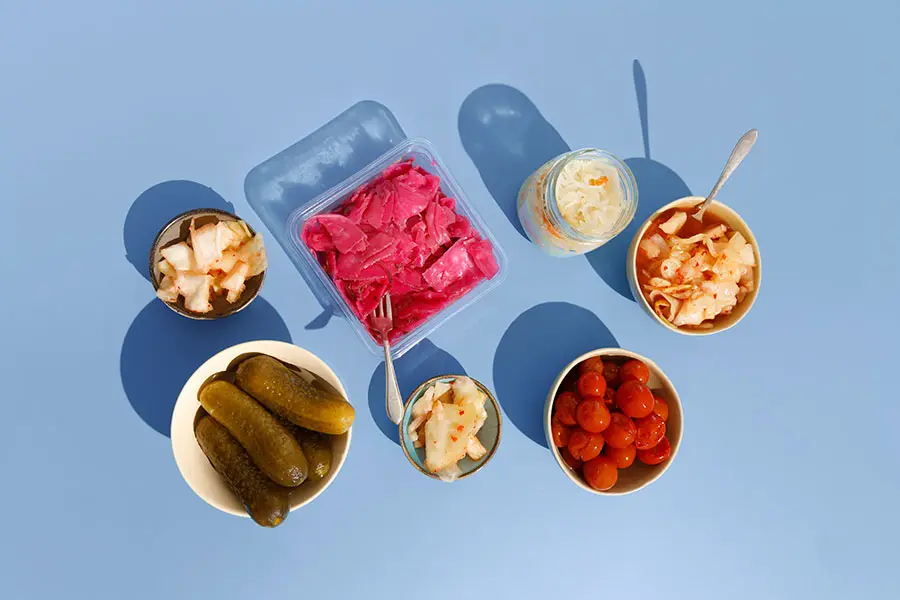
Summary
Weight care during perimenopause and menopause is influenced by factors such as chronic inflammation, gut health, and emotional resilience. Managing inflammation through an anti-inflammatory diet, optimizing the gut microbiome with fiber, probiotics, and prebiotics, and supporting emotional well-being with stress management and self-compassion can improve metabolic health, reduce symptoms, and support sustainable weight loss for women in midlife. Incorporating GLP-1 medications, lifestyle changes, and mindful eating further enhances outcomes.
Congratulations for starting Month 3 of your Weight Care program. We hope you’re feeling better every day, and that you’re excited for the next stage of your journey. This month, we’re going deep on three important topics that can impact midlife metabolism and body composition: managing inflammation, optimizing gut health, and building emotional resilience. Let’s explore how each of these factors can enhance your results....
Inflammation & Weight
Inflammation is the body’s natural protective response to infections, injuries, or irritants. Acute inflammation shows up as swelling, redness, and heat…all of which help the body heal.
Chronic inflammation, though, has no obvious external symptoms. It happens silently inside the body, and over time, it can contribute to serious health issues including heart disease, type 2 diabetes, certain cancers, cognitive decline, and yes, symptoms of perimenopause and menopause.
Furthermore, inflammation markers naturally increase during perimenopause and menopause, according to research published in the Journal of Clinical Endocrinology & Metabolism. It’s important to manage, because chronic inflammation can:
Damage healthy tissues and organs
Interfere with bodily functions including your immune system, metabolism, and hormone regulation
Increase the risk of cardiovascular disease, cancer, type 2 diabetes, arthritis, and autoimmune disorders
Lead to insulin resistance, which can cause higher blood sugar levels and weight gain
Elevate cortisol levels, a stress hormone that can lead to fat accumulation around the midsection
Contribute to cognitive decline and neurodegenerative disease
There is good news, and we’re here to help. You can take steps to lower inflammation in the body—losing weight is one of them—and that progress can help middle-aged women process and use energy more efficiently. You’re on the right path by taking a GLP-1 medication, but you should also follow an anti-inflammatory diet. That means avoiding high-calorie foods that are low in vitamins and minerals and instead focusing on nutrient-rich, high-fiber foods.
Anti-inflammatory Foods:
Nuts and seeds: They’re more than just healthy fats; they’re functional foods for gut health. Almonds, in particular, have been shown to increase the production of short-chain fatty acids (a type of postbiotic) that help rebalance the gut microbiota and reduce systemic inflammation, according to research in The American Journal of Clinical Nutrition. A small handful a day—for example, sprinkled onto a salad or your avocado toast—can support digestion, immunity, and metabolic health, especially in midlife.
Berries: While all fruits have health benefits, berries containing anthocyanins (especially black raspberries) reduced inflammatory markers twice as effectively as other fruits in women over 45, according to a study in Nutrients.
Cruciferous vegetables: Compounds called isothiocyanates in broccoli, cabbage, and Brussels sprouts target a pathway that drives menopausal inflammation, according to a systematic review in Clinical Nutrition.
Fermented foods: While whole grains have benefits, recent research in Cell (2021) demonstrated that fermented foods like yogurt, kimchi, and sauerkraut increased microbiome diversity and reduced inflammatory markers more significantly than fiber alone. Six servings weekly was the threshold for meaningful anti-inflammatory effects.
Protein: A 2022 study in Menopause found that fatty fish containing omega-3s (salmon, mackerel) decreased inflammatory markers, while also reducing hot flashes in perimenopausal women. And rotating protein sources (rather than eating the exact same protein daily) created more diverse gut bacteria profiles associated with lower inflammation, according to 2023 research in Nature Metabolism.
Other lifestyle factors that can help minimize inflammation are physical activity, stress reduction, limiting alcohol intake, and good sleep. And if you smoke, definitely seek help to quit: that’s a major source of unwanted inflammation.

Keep Your Gut Healthy
A healthy gut is essential for proper digestion, nutrient absorption, and waste elimination. The gut microbiome—a diverse ecosystem of bacteria, fungi, and viruses in your digestive system—plays a pivotal role in your overall health. With aging and a decrease in estrogen, you’ll likely experience some changes (bloating, gassiness, constipation, or IBS). And an unhealthy gut can lead to inflammation, obesity, insulin resistance, and hypertension.
In fact, a groundbreaking discovery called the “estrobolome” (the collection of gut bacteria that metabolize estrogens) is responsible for at least part of the connection between gut health and midlife weight changes. When these bacteria are imbalanced, they can:
Reduce the recycling of estrogens in the body
Increase fat storage around the abdomen
Create insulin resistance
Trigger food cravings through altered dopamine signaling
So, how do you improve your gut health?
Eat more fiber. Think of fiber as a brush, gently cleaning out your colon so only the good, healthy stuff is left. High-fiber diets promote growth of the “good bacteria” and aid in regular bowel movements. Start looking at labels or use a food tracker or tool like ChatGPT to make sure you’re hitting at least 25g a day. Fiber-rich foods include fruits, vegetables, whole grains, beans, brown rice, nuts, seeds, and legumes.
Eat more probiotics (fermented foods). In the dairy department, go for yogurt, kefir, and buttermilk. Then there are the superstars of fermentation: kimchi, sauerkraut, pickled vegetables, tempeh, kombucha, sourdough bread, and miso. Go big on all these. (Win-win: They pack tons of flavor without extra calories.) Consuming small amounts (2-3 tablespoons) of different fermented foods 5+ times weekly increased microbial diversity by 19% more than larger portions consumed less frequently, according to scientists at Stanford.
Eat prebiotic foods. Prebiotics are found in foods like garlic, onions, bananas, and leeks. For instance, a study published in Scientific Reports found that a calorie-restricted, adequate-fiber diet combined with probiotics led to significant improvements in body composition and obesity-related biomarkers among obese women.
Consider a supplement. A synbiotic includes both probiotics (good bacteria and yeast) and prebiotic fiber (which feeds the good bacteria). The Alloy Synbiotic contains spore probiotics and prebiotic fiber from golden kiwifruit and a citrus extract that can protect the gut barrier, decrease inflammation, and increase immunity.
Practice mindful eating. Rushing through meals can disrupt digestion. Taking time to chew properly activates enzymes in your saliva that kick-start the digestive process—supporting nutrient absorption and reducing bloating.
Stay hydrated. Your gut needs water to move things along. Staying well hydrated helps maintain the mucosal lining of the intestines and keeps digestion smooth. It’s also a key defense against constipation.
Limit alcohol consumption. Alcohol can disrupt the balance of good bacteria in your gut and irritate the lining of your digestive tract. Keeping intake in check supports a healthier microbiome—and a more predictable GI system.
Your gut produces over 90% of your body’s serotonin and 50% of your dopamine—neurotransmitters that regulate mood, motivation, and cravings. This helps explain why gut health directly impacts emotional eating patterns.
Women with diverse microbiomes showed significantly less stress-induced eating and better emotional regulation, per research from UCLA. This connection between gut health and emotional well-being highlights how powerful the gut-brain axis can be for managing eating behaviors.

Pay Attention to Your Emotions
A large part of your weight loss journey includes a mental element—your emotions, your psyche, and your peace of mind. It’s important to take care of those softer aspects of yourself, too, and to practice self-compassion.
Dr. Montville’s tips for emotional self-care:
Manage stress. There are many methods for curbing anxiety and burnout, like practicing meditation, journaling, breathing exercises, taking walks, listening to music, and guided imagery. Experiment to see what helps you.
Prioritize sleep. Not only does a solid night of shuteye prepare us for the zigs and zags the next day will bring, but it will also impact your hunger cues. That’s because around hour seven of your overnight sleep, hormones in your body turn on and tamp down your hunger mechanism for the next day. When we don’t reach that point, the opposite happens—our bodies send messages that we need more food tomorrow for energy.
Set boundaries. In your relationships, do your best to set boundaries by clearly communicating your needs and limits—and sticking to them.
Consider therapy. If it’s new or challenging for you to prioritize your needs and wants, a therapist can help you develop strategies for boundary-setting, stress coping tools, and more.
Get regular exercise and eat healthy. Your physical well-being hugely contributes to your emotional health. That impact goes both ways—positive and negative.
Avoid unrealistic health standards. This can lead to obsession, anxiety, and guilt. Each of us has a different backstory, lived experience, genes and environment to navigate. Embrace who you are, where you are, and celebrate you uniqueness.
Maintain strong human connections. Make time in your life to nurture relationships with loved ones and friends. Ideally, you meet up with people you care about in real life, which is proven to be more powerful for our emotional well-being than digital communication.
Be kind to yourself. Avoid criticizing yourself, and try to catch yourself if you’re fixating on small mistakes. Give yourself grace for missteps and use all of the lifestyle and behavioral tools you now have in your “toolbox” to feel centered…and even hopeful.
Quieting Your Mind
Are you hearing less “food noise”—constant internal chatter about what to eat, how much, cravings, calorie fixation—since you started taking a GLP-1? For many, that absence is one of the most satisfying and surprising effects of losing weight.
But for some, this change can also lead to sadness. Afterall, our go-to coping tool—food—is no longer such an enticing way to soothe ourselves when we’re stressed or anxious. It can also be challenging to adjust to having more time and mind space, without the background food noise we became accustomed to over the years.
Leaning into a hobby, focusing on skincare and self-care rituals, and practicing your stress-relieving activities are healthy ways to fill up that space. Take a minute to think about your experience in the past compared to what’s happening in your head now. Have those thoughts become less intrusive to your daily life?
Month 3 Activity
As you start a new month, make it a point to check in on your initial S.M.A.R.T. goals. If you’ve been keeping a log, assess your progress: note your physical and mental challenges and how you moved past them. And if you need to update your goals, now’s the time to do so and share with your doctor.
Remember that sustainable change happens through consistency, not perfection. You’re not just losing weight—you’re gaining metabolic health, emotional resilience, and a deeper understanding of your body’s unique needs.
You’re well on your way in your journey—give yourself a well-deserved high-five or moment to process how far you’ve come, and then get ready for more dramatic changes this month. We’re cheering you on.
Sources:
https://www.nature.com/articles/s41538-025-00403-0?utm_source=chatgpt.com
https://pmc.ncbi.nlm.nih.gov/articles/PMC7912458/?utm_source=chatgpt.com
https://pmc.ncbi.nlm.nih.gov/articles/PMC10574492/?utm_source=chatgpt.com
https://www.biorxiv.org/content/10.1101/2025.04.23.650130v1.full?utm_source=chatgpt.com
https://www.maturitas.org/article/S0378-5122(17)30650-3/fulltext
https://www.nih.gov/health-information/emotional-wellness-toolkit
https://pmc.ncbi.nlm.nih.gov/articles/PMC3348044/
https://health.clevelandclinic.org/food-noise-and-how-to-stop-it
Related Content
Citations
Chronic Inflammation. In: StatPearls. NBK493173.
View sourceNational Institutes of Health. Berries as a Treatment for Obesity-Induced Inflammation: Evidence from Preclinical Models - PMC.
View sourceNational Institutes of Health. Effects of Omega-3 Polyunsaturated Fatty Acids Intake on Vasomotor Symptoms, Sleep Quality and Depression in Postmenopausal Women: A Systematic Review - PMC.
View sourceNational Institutes of Health. Emotional Wellness Toolkit — More Resources.
View sourceNational Institutes of Health. The role of cytokines and hot flashes in perimenopausal depression - PMC.
View source
Subscribe
Go ahead, you deserve to
feel fantastic
By subscribing you agree to our Terms of Service & Privacy Policy.